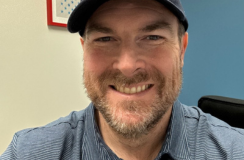s a college student during the 2008 recession, George Vallone found hope in stories of people who were beating the economic downturn and actually turning the crisis to their advantage. When the COVID pandemic hit in 2020, he drew on these examples, and started looking into acquisition entrepreneurship.
George brought 10 years of experience in software sales to his acquisition decisions. One specific thing he took from his time in SaaS was the recurring revenue model, making that a priority in his search.
George also applied the sales funnel mindset to his search process. He used virtual assistants to put together a list of 400 cleaning businesses, looking specifically in cities that were seeing a lot of growth. He then got to work cold calling and conducting drip email campaigns.
Through a series of criteria, George whittled those 400 businesses down to three that he made offers on. He ultimately acquired Nuveldy's Apartment Turnover Services of Nashville, Tennessee, in January 2021.

Soon after taking over the business, George saw an opportunity to reposition it as solely focused on apartment turnover, that is, the deep cleaning and maintenance work done to an apartment unit to prepare it for the next tenant. He politely fired the company’s other clients and doubled down on apartment complexes, seeing significant growth in his first year of ownership.
In this episode of Acquiring Minds, George discusses the initial cash flow issues he dealt with and how they could have been avoided, and what he didn’t like about residential and Airbnb customers. He also outlines why it’s important to understand the seller’s motives, and shares his thoughts on roll-up and holdco acquisition strategies.
Check out:
✳️ Top takeaways from the episode
✳️ Episode highlights with timestamps
Acquisition Entrepreneur: George Vallone
💵 What he acquired: When the COVID pandemic struck in 2020, George drew on examples of people who had thrived during the Great Recession of 2008. He began looking around for business opportunities, and settled on the buy-and-build method. He put together a search framework, and acquired Nuveldy's Apartment Turnover Services in January 2021.

💡 Key quote: “It's not, Hey, I want to buy your business: It’s I want to have a conversation about how much your business is worth, and then I'll decide if I want to buy it or not. It's not predatory, and they're getting some value out of that conversation as well. I'm an investor, let's talk about your valuation. If I don't like it, at least now you know what your valuation is from somebody who could buy your business, and maybe why I'm walking away or why I want to move forward.”
👋 Where to find him: LinkedIn
Acquisition Tips From the Episode
Top takeaways from this conversation
✔️ Avoid a cash flow crunch by understanding every step of the payment process.
When George was modeling Nuveldy’s finances, he neglected to consider certain aspects that could impact his cash flow.
Apartment turnover services must be credentialed by insurers, and register a tax ID number with every property. Until those steps are completed, the customer won’t pay. George wasn’t aware of this and assumed he’d be seeing payments immediately.
He also didn’t take into account that some businesses take a considerable amount of time to pay. Mailed payments take 30-60 days to arrive, compared to Automated Clearing House (ACH) payments, which take about two weeks.
George switched some customers over to ACH. It took four to six weeks to get everything in place so his customers could pay him. He wasn’t collecting any money during this time.
“When you take over a new business, understand how the cash is going to flow into your business. Don't do your projections on an accrual basis. Do them on a cash flow basis, because you really need to understand when that cash is actually going to hit your bank account,” George says.
He also advises asking the sellers to walk through each step of the payment process, from whether any licenses or certifications are needed, to how customers pay and how long that takes.
💬 Use cold outreach to initiate a conversation about the value of the business.
When George began reaching out to business owners, he knew the messaging was important. He didn’t want to come across as a predatory investor, so rather than starting off saying he wanted to buy their business, he took the approach of initiating a conversation.
“The messaging that I used was, I'm an investor looking to purchase small businesses. Have you considered the valuation of your business? And are you open to a conversation around that valuation?” George says.
Most of the people he spoke to had built their businesses from the ground up and hadn’t been to business school. When George explained the valuation process, he found that many owners were very excited that someone was interested in acquiring their business.
He also realized that owners had put their blood, sweat, and tears into their businesses. It was important to them that the person they sold to would look after it.
“I tried to reassure them that I was the right guy, and I have the skill set to not drive their precious business into the ground afterward,” George says.
🪜 Create an outreach funnel and take it step by step.
After deciding he wanted to acquire a cleaning company, George structured his outreach funnel and broke his search into stages.
First, he decided to focus on southern markets, after reading that many people were leaving major cities in the Northeast. He assumed that with the increase in remote work, many people would be interested in moving to states without income taxes. He had virtual assistants help him build a list of 400 cleaning businesses in key cities that fit his criteria.
List in hand, George got to work with drip campaigns and cold calling. Over the course of several months, he had good conversations with about 75 to 100 of those 400 businesses.
He narrowed that number down to 20 serious conversations, then whittled that 20 down to 10 businesses that were open to selling. He got financial information for those 10 businesses, which helped him reduce the number to five. He made offers on three, and finally settled on the one he would acquire: Nuveldy’s.
Episode Highlights
Inflection points from the show
[1:43] Recognizing the opportunity in crisis and wanting to be on the winning side.
[5:33] Why B2B software sales gave George an appreciation for recurring revenue models.
[7:45] George’s advice on cold calls.
[10:56] Why being flexible on location opened up a lot of doors in his search.
[13:35] Using a virtual assistant to put together a list of businesses.
[18:51] Coming up with the right messaging when cold calling business owners.
[25:32] Getting top-line financial information from owners, rather than in-depth information that would have been available through brokers.
[27:01] What George found attractive about Nuveldy’s.
[29:39] Understanding the reasons why a seller wants to sell their business.
[31:19] Realizing the opportunity to rebrand the cleaning company into an apartment turnover service.
[34:22] Why residential cleaning and Airbnb customers aren’t very profitable.
[37:35] How to make it easier for workers to do good work.
[40:25] Focusing on quality as a marketing strategy.
[44:04] Investing heavily in customer service and quality assurance to increase customers’ lifetime value (LTV).
[49:06] Breakdown of what George bought the business for and how he financed the acquisition.
[50:35] How overlooking key information led to a scary cash flow problem early on — and how you can avoid a similar situation.
[56:19] George’s bold business plans for 2022.
[57:55] The potential for a roll-up acquisition in the near future.
[1:02:34] The culture shock that came with moving from the New York City area to Nashville.
Links & Mentions
✅ Nuveldy's Apartment Turnover Services
✅ "Buy Then Build: How Acquisition Entrepreneurs Outsmart the Startup Game"
✅ Upwork













%20-%20thumbnail.png)






%20-%20thumbnail.png)



%20-%20thumbnail.png)

.png)




%20-%20thumbnail.png)















%20-%20thumbnail.png)




























































